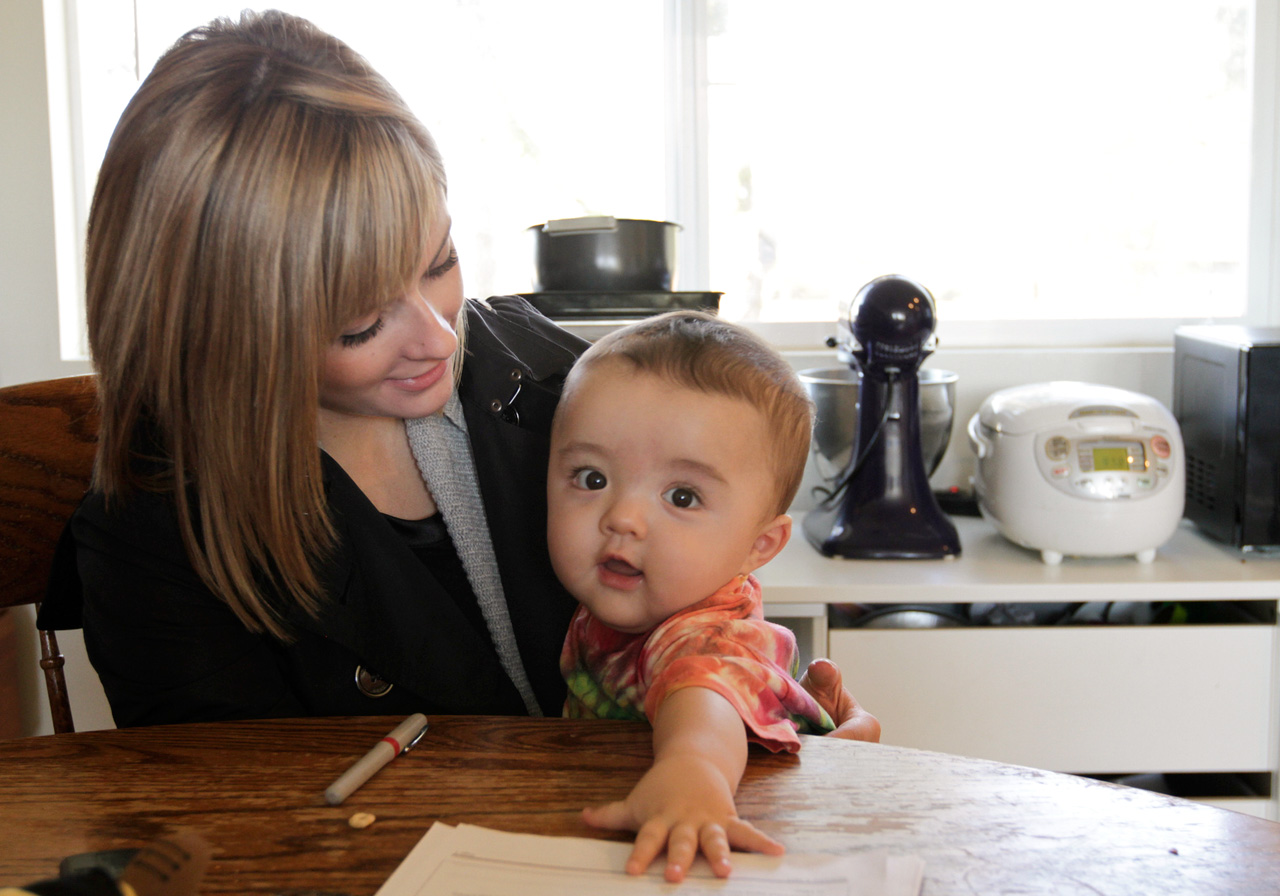At six months pregnant, I am the only lifeline for little one growing within me. Firmly attached, Baby derives everything it needs right now from me.
But once my first child is born, I will no longer be its sole source of love, security, and comfort. I will not become that idealized picture of an attachment parent, the all-giving, all-sacrificing mother who is totally serene, fulfilled, and at home in her domestic enclave. I will not be constantly present, always responsive, 24/7/365. I believe this perfect mother does not exist.
As a mom-to-be, the basic philosophy behind attachment parenting resonates with me. Sustained, continual engagement between parents and kids helps their development throughout their lives. I'm on board and plan to breastfeed, do skin-to-skin, wear my baby, etc. etc. But I recognize our inevitable limitations as mothers (and as people). I know I won't be able to do it all. The image of the always-there, always-giving mother that comes with attachment parenting burdens moms with unrealistic expectations and unnecessary guilt.
Though I'd like to be an endless supply of love and care for my children, I'm pretty sure the well will sometimes run dry. Though I'd like to think I will joyfully set aside my needs and wants for my children every time, I'm pretty sure there will be times when I will gladly place my kids in others' loving hands so I can attend to my own needs and recharge my batteries. I'd like to think that my children won't necessarily be worse off for these times.
Without a doubt, the mom is the primary figure in a child's life, especially in the early years. But the one who is called Mother isn't the only one who is called to mother. I love the idea in Bonnie Miller-McLemore's book Also a Mother of "othermothers," those aunts, sisters, cousins, neighbors, and friends (might I also say – uncles, brothers, and male friends) who gather 'round to nurture a child and support the primary mother in her caretaking responsibilities.
People in other cultures seem to have nailed this role down better than those in American society. As a young child growing up in China, I have as many memories of "othermothers" taking care of me as of my own mother taking care of me – waiting for the bus with my great-grandma, my paternal grandmother chasing me down for a spanking, getting my toenails clipped by my aunt. Did I miss my mom? Probably. Did I feel any less loved because she wasn't always there? Probably not.
In our society, there seems to be a growing trend towards more shared models of parenting – homeschool co-ops, intentional living communities, the naming of godmothers and godfathers. Gina Dalfonzo's recent post on how childless adults can play a pivotal role in children's lives is a lovely illustration of these possibilities. These visions of shared parenting can help balance out the staggering weight that attachment parenting places on mothers.
I'll admit, though I have intentionally worked to dismantle unrealistic expectations of my role as mother as I prepare for my first child, the Wonder-Mother always comes to perch on my shoulder when I consider the possibility of others taking care of my children, or wonder if I could take a week away for that writing workshop I want to attend next year. "Oh no!" she squeaks in alarm, "Your child will definitely suffer some irreparable emotional damage from that!" Yikes.
It's a good thing to be always mindful of the psychological effects a mother's (or father's) absence might have on a child. For that, I am thankful for the teachings of attachment parenting. It gets dicey, though, when a single, imperfect human being – namely, the mother – is held up as a child's sole source of nurturing and life. This is often the implicit message I hear from those who advocate for attachment parenting.
No doubt, the attachment parenting model serves as a much-needed antidote in a culture where the idols of career advancement, efficiency, and wealth accumulation are placed above the needs of our youngest generation. At the same time, when we raise up the mother-child attachment to such heights that women feel compelled to live up to the illusory ideal of the do-it-all, be-it-all mother, or else feel like failures, we run the risk of idolizing that attachment and obscuring the broader vision that Jesus casts for us.
"Who is my mother, and who are my brothers?" he asks when told that his biological family was standing outside. "And stretching out his hand toward his disciples, he said, 'Here are my mother and my brothers! For whoever does the will of my Father in heaven is my brother and sister and mother'" (Matt. 12:46-50).
So let us attend to our children and bond with them to the best of our abilities. Let us remember that we will sometimes fail. And in learning to love those closest to us, let us extend our vision beyond our own children and families to the larger family of God to whom we ultimately belong.
Liuan Huska is a freelance writer. Follow her on Twitter at @LiuanHuska and check out her blog on embodiment and faith at Body & Being.


